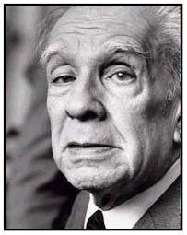Jorge Luis Borges was a famous Argentinean writer , who was known by his genius in writing poetry. Borges is one of the best writers in the world. His works are inspired by his meetings, his journeys in Europe, but also by his Argentineans origins.
Borges was born in 1899 in Buenos Aires (Argentina) and he died on June 14th 1986 in Geneva. He was the oldest of the family and he spent his childhood quietly in a large house of a wealthy area of Buenos Aires, called: "Palermo". Before the age of nine he didn't attend any school , but he followed private lessons with his sister Norah (a future painter) given by an English governess. That's why he learnt English and Spanish, and why he was able , at the age of nine, to write his first tale in Spanish and to translate an English novel. Jose Luis Borges was more than a brilliant child, he was a genius. Since his childhood, he was very keen on Europeans writers as Oscar Wilde, Kipling, Stevenson, Dickens…..He was fifteen when he started to move to Europe and since that age, he visited a lot of Europeans countries. As his family was rich, he started to work late and he published his first book in 1923, date of the beginning of his long writing career.
Borges, a great traveller
Jorge Luis Borges moved to a neural country (Switzerland) at the beginning of the first world war. This first reason of this moving is both a political and economic, because with the war, it's all the economy which is concerned .The second reason was to find a hospital for his father who was getting blind. This family reason moved him because he really loved his father who was of great help for him, in his studies. Moreover, in Europe, he hoped to meet his favourite writers and he achieved in it. Later, in 1919, at the end of the war, he moved to Spain, in order to meet other writers. In Spain, he participated to an ultraďst movement for which he wrote a lot of tales, poems and articles. There, he met Rafeal Cansinos-Assens, a friend that Borges considered as his model throughout his life. With him, Barges continued to speak and learnt many Europeans and Orientals language. In 1921, he returned to Buenos Aires and he discovered for a twice this city, his native town… In 1923, it was his father who published his first real book: Fervor de Buenos Aires : that was the real beginning of his writer career. His writer career pushed him to move from country to others, in each country, he made speeches and conferences, … . That was why he went to Great Britain, Scotland, Spain, Switzerland, Sweden and France in 1962. This reason for those moving were the consequences of the celebrity. If we look on those trips, we can see that all are success for Jorge Luis Borges and he found what he was looking for in each country he visited (and even he wasn’t looking for).
A writer who kept his origins.
Borges travelled a lot because of his genial work. But, in this work, Borges kept his Argentinean culture, and if he was called by European country’s leaders, it was to speak on his work. That’s why we can deduce that he had kept his origins all his life, and to prove it, he demanded, to be buried in his native country. As he returns many times to Argentina, he had kept friends and contacts there and so, he kept his traditions and his culture, in reality, he never forgot his origins...
For us: a genius
Nowadays Jorge Luis Borges is recognized as one of the greatest writers of the world. We think he is an amazing person, which was used to study, because he had the courage to express his opinions about lots of different topics. In our opinion, Jose Luis Borges was a genial writer: he started very young (at the age of seven) and he wrote different types of works as tales, essays and poems. Moreover, he was able to speak a lot of languages like Spanish, French, German, English……and he was rewarded many times. That was why his death in 1975 was a terrible event in the literary world. That’s why, in our life of student, a so fascinating writer seems interesting to study, as we do with French authors like Baudelaire, … but we think now, it’s time to open our mind and learn about foreign authors we don’t knew before.
Matthieu, 1ère S, 2001-2002
